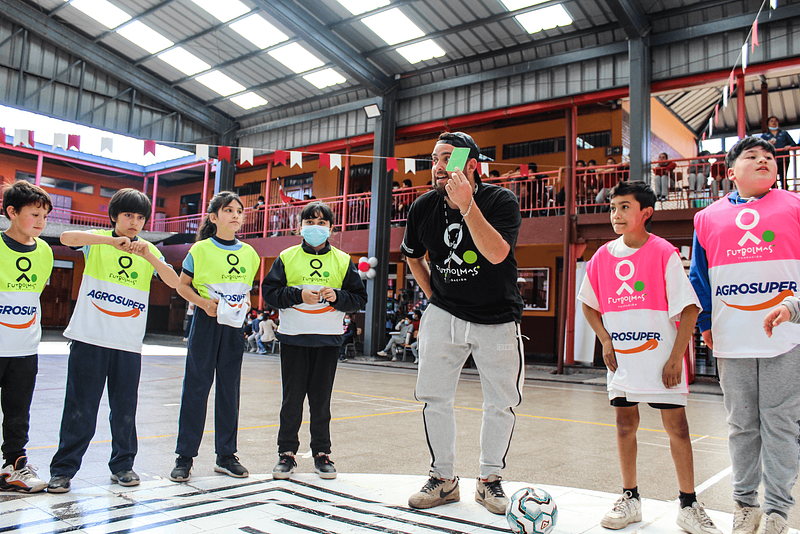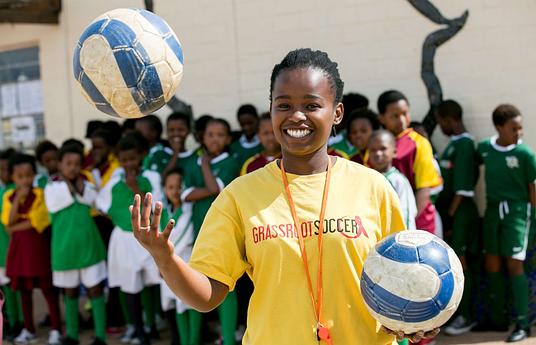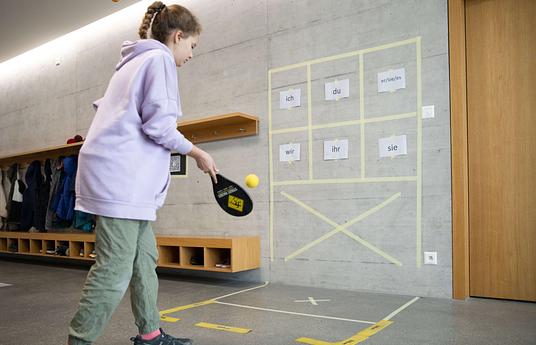From the ages of 9-14, young people are especially vulnerable to social influence, making it a critical period for teaching lifelong health-seeking behaviours. We need to talk about important topics such as HIV prevention and violence, especially in communities where these topics are often taboo or where misinformation spreads readily. So how can we break the stigma and engage young people where they are at?

Grassroot Soccer Programme
Grassroot Soccer sees the potential of soccer to teach vital adolescent health information. The SKILLZ Core intervention uses interactive games to address topics such as HIV and violence prevention, gender, power dynamics, and future orientation/goal setting. The model uses a fun learning environment to ensure that health messages resonate and leave a lasting impact through adolescence and into adulthood.
“I learned how to be able to stand up for myself, to be able to protect myself from risky behaviors such as abusing drugs and alcohol.” - Blessing, former Grassroot Soccer SKILLZ Core participant
Blessing, a former Grassroot Soccer SKILLZ Core participant from Zimbabwe explains that through the programme, "I learned how to be able to stand up for myself, to be able to protect myself from risky behaviors such as abusing drugs and alcohol. Temptations are many, especially peer pressure from friends to date someone older than you because you stand to gain financially from the relationship. But I knew how to ‘Say No’ and mean it at the same time. I also learned how to interact with other young people and I gained self confidence. [...] once I became part of the SKILLZ team, I felt like a community icon and a role model. I knew how to conduct myself in the community as a young girl so that I inspire positive change. I felt I had the responsibility to help the other young people in my community, and I started at home with my little sisters by making sure they also became part of SKILLZ programs and could access the sexual and reproductive health (SRH) services that were offered by the organization.”

Fundación Fútbol Más programme in Chile
Fútbol Más also uses the connecting power of soccer to promote wellbeing and safe spaces for children and adolescents in vulnerable communities. They started by working in the heart of communities in Chile, using sports to help children learn social emotional skills. "Fútbol Más' methodology is anchored on 3 pillars that are present in each of its interventions: the promotion of life skills, the development of meaningful bonds, and the promotion of an enabling environment for resilience. We use a playful and positive approach with children and adults, highlighting the strengths of each individual through the Fútbol Más Green Card," explains Virginia Abara, Head of Global Partnerships at Fútbol Más.
In 2023, in the schools programme in Chile, implemented in 26 schools, the percentage of children in an optimum level of well-being increased by almost 7 percentage points between the beginning and the end of the programme
Founded 16 years ago in Chile, Fútbol Más has grown to diversify its methodology to different contexts ranging from disadvantaged communities and schools to emergency response programmes, in more than 15 countries in Latin and Central America, Europe and Africa. Their programmes have had measurable results on the well-being of children they have worked with. In 2023 in the schools programme in Chile, implemented in 26 schools, the percentage of children in an optimum level of well-being increased by almost 7 percentage points between the beginning and the end of the programme, measured with the WHO-5 well-being index.
Incorporating physical activity into the school day
It’s hard to concentrate when you try to sit still all day. Sometimes you need a short burst of movement to improve your mood and increase concentration. That’s what imoves is doing to integrate physical activity into the school day through easy-to-follow videos like this one:
imoves provides the opportunity for students from as young as 4 years old to move and learn in the classroom. Short bursts of movement for just 3 minutes floods the brain with ‘happy hormones’ like serotonin, noradrenaline and dopamine, which improves mood and wellbeing almost immediately.
“Moving more = Happier Children”
"Using activities such as the imoves active blast movies stimulate blood flow to the brain, so that fresh oxygen flushes out toxins that cause fatigue and tiredness. This boosts children's focus and ability to concentrate for longer. It's not rocket science, it's just nature. Moving more = Happier children. Happier children are easier to teach and develop as they are more motivated to focus and learn.” explains Imogen Buxton-Pickles, Founder of imoves.

Street Racket also makes it easy and fun to encourage physical activity at school while allowing for cross curricular learning. “The games aim for a holistic approach to promote both body and mind. It creates an active classroom, indoors and outdoors, while promoting 21st century skills, equality, sustainability, inclusion and feelings of success and belonging from the very start.” explains Marcel Straub, Founder of Street Racket.
Street Racket supplements the Four Cs of 21st century skills (cognition, cooperation, communication, creativity) with coordination because movement is essential for supporting student learning.

These innovations show us the power of bringing movement and physical activity beyond the P.E. classroom, building stronger social bonds, improving health outcomes, and making school more enjoyable for all. Are you interested in bringing them to your community? Check out their innovation pages to learn more!
Want to learn more about impactful education innovations? Check out the 2024 Global Collection report.
Working on your own innovation? Submit your innovation to be considered for the next collection.


